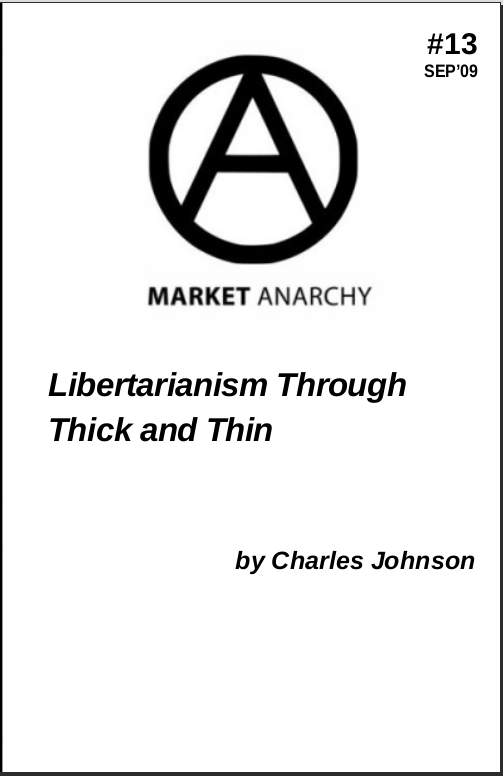C4SS has teamed up with the Distro of the Libertarian Left. The Distro produces and distribute zines and booklets on anarchism, market anarchist theory, counter-economics, and other movements for liberation. For every copy of Charles Johnson’s “Libertarianism Through Thick and Thin” that you purchase through the Distro, C4SS will receive a percentage. Support C4SS with Charles Johnson’s “Libertarianism Through Thick and Thin“.
$1.00 for the first copy. $0.75 for every additional copy.
To what extent should libertarians concern themselves with social commitments, practices, projects or movements that seek social outcomes beyond, or other than, the standard libertarian commitment to expanding the scope of freedom from government coercion?
Clearly, a consistent and principled libertarian cannot support efforts or beliefs that are contrary to libertarian principle—such as efforts to engineer social outcomes by means of government intervention. But if coercive laws have been taken off the table, what should libertarians say about other religious, philosophical, social, or cultural commiments that pursue their ends through non-coercive means, such as targeted moral agitation, mass education, artistic or literary propaganda, charity, mutual aid, public praise, ridicule, social ostracism, targeted boycotts, social investing, slow-downs and strikes in a particular shop, general strikes, or other forms of solidarity and coordinated action? Which social movements should they oppose, which should they support, and towards which should they counsel indifference? And how to we tell the difference?
Abstracting from the numerous, often mutually exclusive details of specific cultural projects that have been recommended or condemned in the name of libertarianism, the question of general principle has to do with whether libertarianism should be seen as a “thin” commitment, which can be happily joined to absolutely any non-coercive set of values and projects, or whether it should instead be seen as one strand among others in a “thick” bundle of intertwined social commitments …
In this article, individualist anarchist Charles Johnson lays out six different ways that libertarians might connect other forms of social transformation, such as feminism, anti-racism, labor radicalism, or environmentalism, to the struggle against state coercion — and argues that libertarians should see opposition to state coercion as one strand among others in a “thick” bundled of intertwined social commitments, aiming to resist multiple, interlocking systems of oppression.








